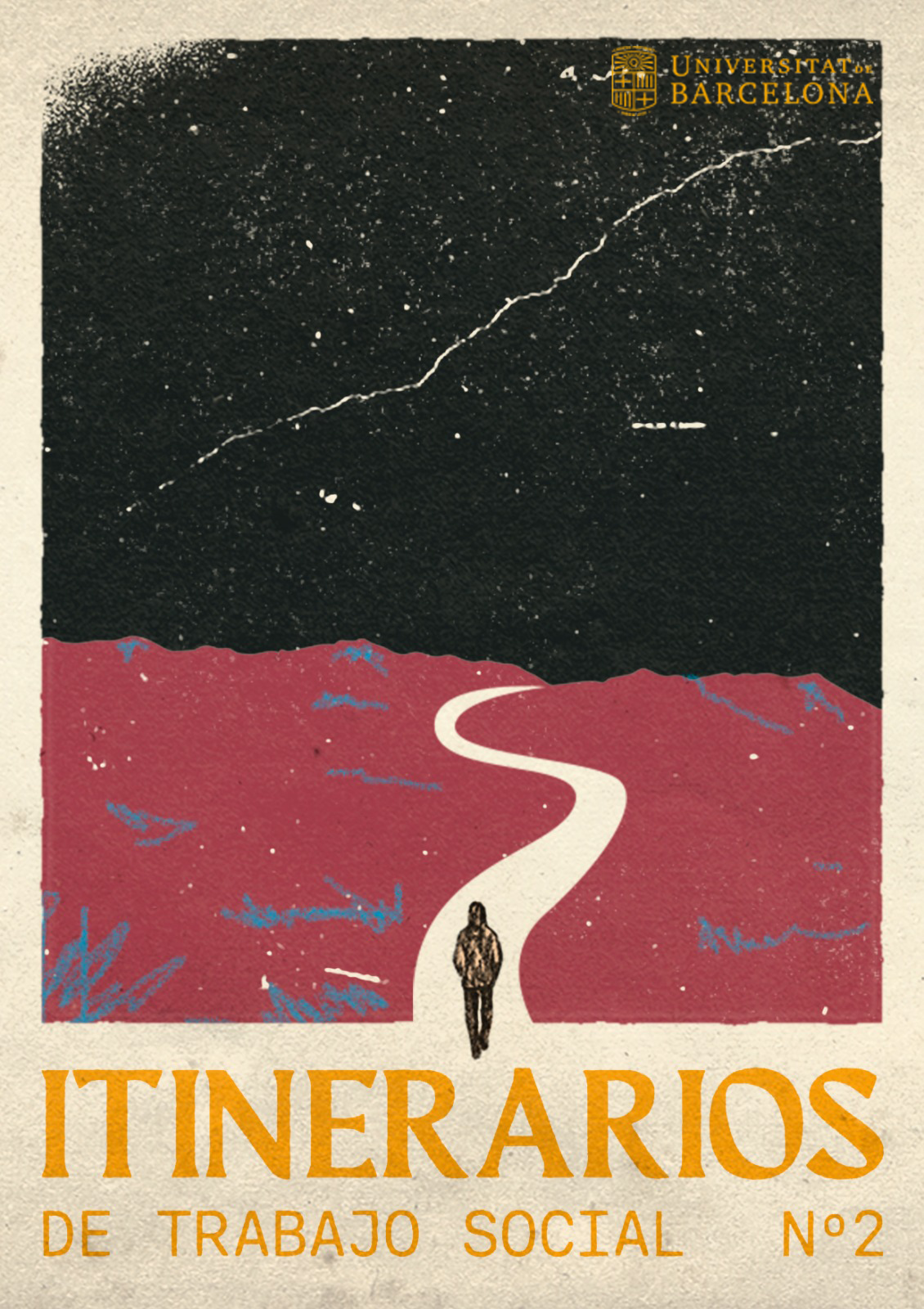Knowledge and learning in the course ‘Role and Identity’ in Social Work
DOI:
https://doi.org/10.1344/its.i2.36354Keywords:
identity, Social Work, complexity, (auto)biographyAbstract
In this paper we discuss the conceptual and methodological principles underlying the course ‘Role and Identity’ of the Degree in Social Work at the University of Barcelona. The main purpose of this paper is to generate a space for reflection of the concepts approach underlying the pedagogical and theoretical approach of the subject, which may be of interest to both Social Work students and professionals. For this reason, this paper takes the shape of an essay, to facilitate the reasoning and the theoretical-reflective explanation derived from the experiences, knowledge and learning of the teachers who have been part of this course. This theoretical review of the course is tackled from two dimensions: the ontological dimension of the content of the teaching plan and the epistemological dimension of the educational methodology. In this sense, we reflect the need of Social Work students to acknowledge the underlying complexity required to understand their personal and professional reality and situates the (auto) biographical narrative as the strategy that allows students to think and (re) think themselves as subjects, and at the same time (re) construct this complexity.
References
Arendt, H. (2012). La condición humana. (7ª ed.). Barcelona: Paidós
Arfuch, L. (2010). El espacio biográfico. Dilemas de la subjetividad contemporánea. (1ª ed.). Buenos Aires: Fondo de Cultura Económica.
Barthes, R. (2004). Roland Barthes por Roland Barthes. (1ª ed.). Barcelona: Paidós Contextos
Beck, U. (1998). La sociedad del riesgo. Hacia una nueva modernidad. (1ª ed.). Barcelona: Paidós
Bruner, J. (2006). Actos de significado: más allá de la revolución cognitiva. (1ª ed.). Madrid: Alianza
De Man, P. (2007). La autobiografía como des-figuración. En: La retórica del Romanticismo. Madrid: Akal.
Delors, J. (1996). Los cuatro pilares de la educación. En: La educación encierra un tesoro. Informe a la UNESCO de la Comisión Internacional sobre educación para el siglo XXI. Madrid: Santillana/UNESCO
Dustin, D. (2007). The McDonaldization of Social Work. (1ª ed.). England: Ashgate
Foucault, M. (1994). Hermenéutica del sujeto. (1ª ed.). Madrid: la Piqueta Endymión
Gadamer, H. (1993). Verdad y Método. (3ª ed.). Salamanca: Sígueme
Guattari, F. (1990). Las tres ecologías. (2ª ed.). Valencia: Pre-Textos
Han, B. (2015). La sociedad del cansancio. (8ª ed.). Barcelona: Herder
Hill, R. (1992). Nuevos paradigmas en Trabajo Social. Lo social natural. (1ªed). Madrid: Siglo XXI
Illouz, E. (2007). Intimidades congeladas. (1ª ed.) Buenos Aires: Katz Editores
Lejeune, P. (1994). El pacto autobiográfico y otros estudios. (1ª ed.). Madrid: Megazul-Endymion
Morin, E. (2000). La mente bien ordenada. (1ª ed.). Barcelona: Seix Barral
Morin, E., Roger, E., Domingo, R. (2013). Educar en la era planetaria. (1ª ed.) Barcelona: Gedisa
Parton N. & O’Byrne, P. (2000). Constructive Social Work. Towards a new practice. (1ª ed.). New York: Palgrave
Olney, J. (1991). Algunas versiones de la memoria/Algunas versiones del bios: la ontología de la autobiografía. Anthropos, 29, pp. 33-47
Ordine, N. (2013). La utilitat de l’inútil. (1ª ed.). Barcelona: Quaderns Crema
Parra, B., Iannitelli, S., López, T. (2012). Reflexividad y epistemología en la enseñanza del Trabajo Social. En: Emma de Sobremonte de Mendicuti (Ed.). Epistemología, teoría y modelos de intervención en Trabajo Social: Reflexión sobre la construcción disciplinar en España (p. 293-299). Deusto: DeustoDigital
Ricoeur, P. (2006). La vida: un relato en busca de narrador. Ágora, Vol. 25, nº2:9-22
Sanz, A. (2005). El método autobiográfico en investigación social: potencialidades y limitaciones de las fuentes orales y los documentos personales. Aclepsio Vol. LVII, 1, 99-115.
Taylor, C. (2006). Fuentes del yo. La construcción de la identidad moderna. (1ª ed.). Barcelona: Paidós
Zamanillo, T. (2018). Epistemología del Trabajo Social. De la evidencia empírica a la exigencia teórica. (1ª ed.). Madrid: Ediciones Complutense
Downloads
Published
How to Cite
Issue
Section
License
Copyright (c) 2022 Toni Sangrà Boladeres, José Antonio López Rodríguez, Silvia Iannitelli Muscolo

This work is licensed under a Creative Commons Attribution-NonCommercial 4.0 International License.
The author who publishes in this journal agrees to the following terms: (1) The author retains the rights of authorship and grants the journal the right of first publication of the work, (2) The texts will be disseminated under the Creative Commons recognition license detailed in this section.
The authors certify that the submissions have not been presented and will not be presented in other scientific publications, transferring non-exclusively the exploitation rights to the journal for the dissemination of the article in any of the possible formats (print, electronic, media dissemination, social networks or any other). In the case of having been previously submitted, but not published, it is necessary to make this clarification.
The journal is published under Creative Commons Attribution-NONCOMMERCIAL 4.0 International (CC BY-NC 4.0) license. Immediate and free access is permitted and any user is allowed to read, download, copy, distribute, print, search or link to the full texts of the articles, crawl them for indexing, pass them as data to software or use them for any other lawful purpose as long as no commercial use is made. Manuscripts in the journal may be reproduced in whole or in part provided that the source is properly cited. Authors may deposit the final version of their accepted articles in institutional repositories or repositories of their choice.
The journal will exercise this right beyond its own media (web or print) provided that it helps the dissemination of the contents (inclusion in databases, repositories or similar of external institutions).
Dissemination of content
The journal reserves the right to disseminate in print or electronic channels the content of the articles, including social networks and media, among others.













